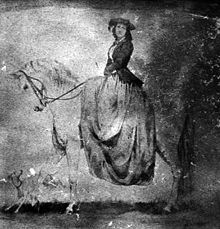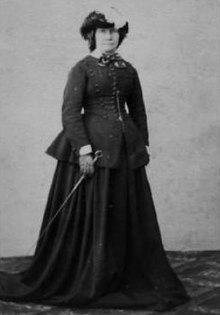Marie Espérance by Schwartz
Marie Espérance von Schwartz , née Brandt (born November 8, 1818 in Southgate in Hertfordshire , England; † April 20, 1899 in Ermatingen , Switzerland ), also Marie Esperance Kalm de Schwartz , Marie Speranza von Schwartz , known by her graced name Elpis Melena ( Greek Ελπίς Μέλαινα ), was a writer of German origin and English nationality. She was a friend of Giuseppe Garibaldi and Franz Liszt and was primarily known in the field of travel and memoir literature.
Life

Early years
Born in England as the daughter of a Hamburg banker, she was raised primarily in Geneva . Widowed to a cousin after an early short marriage, she settled in Rome . With her second husband, the Hamburg banker Ferdinand von Schwartz (* June 8, 1813, † April 14, 1883), whom she had met in Italy, she undertook adventurous journeys through Greece, Turkey, Asia Minor, Egypt and North Africa, however this marriage was divorced in 1854. In Rome, the wealthy and educated, especially linguistically talented woman (she is said to have mastered eight languages) ran a literary salon in which numerous artists and aristocrats frequented. She was friends with Franz Liszt and maintained a lively correspondence with him for many years.
In addition, she continued to indulge her desire to travel.
Garibaldi
Since 1849 Marie Esperance von Schwartz was interested in the freedom fighter Giuseppe Garibaldi . In autumn 1857 she entered into personal relationships with Garibaldi on the island of Caprera ; she lived with him, cared for his children, supported his cause financially and through her writings, and cared for him during his captivity and after he was wounded. She was generally considered to be his mistress; Garibaldi is said to have asked for her hand several times. In gratitude for her self-sacrificing friendship, Garibaldi gave her the manuscript of his memoir, which she quickly translated into German and published in 1861 before her competitor Alexandre Dumas the Elder. Ä. could bring out.
Crete
At the end of 1865 Marie Esperance von Schwartz moved her residence to Crete , where, undeterred by the fighting on the island during the Cretan uprising , she had a charming villa built in the vineyards in Chalepa near Chania . Their sympathy belonged to the insurgents. At her request, Garibaldi sent a contingent of 500 men to Crete to support the uprising. She devoted a lot of time and money to charitable institutions, founded hospitals, asylums, schools, translated German textbooks into modern Greek and Cretan folk songs, sagas and folk goods into German. She earned a high degree of respect from both Christian and Islamic Cretans.
She developed a lively commitment in the field of animal welfare that extended across Europe. In Chania she founded an animal hospital for horses and donkeys, the countless street dogs were fed daily. In numerous brochures in many languages she campaigned for animal protection sponsors and, together with Ernst Grysanowski and Ernst von Weber, campaigned against animal experiments .
After 20 years in Crete, she settled in Switzerland, where she finally died at the age of 80.
Works (selection)
- Experiences and observations of a more than 20 year stay in Crete, 1892, revised new edition: ISBN 978-3-938878-02-6
- Garibaldi. Messages from his life (2 vols., 1884)
- Gemma, or virtue and vice. Novella (1877)
- Cretan bee or Cretan folk songs, legends, love, thought and moral sayings, collected and published; Georg Franz, Munich 1874, MDZ
- From Rome to Crete. Travel sketch (1870)
- The island of Crete under the Ottoman administration , Arnold Hilberg, Vienna 1867; ( Digitized version )
- The young stilt dancer , episode during a journey through the western Pyrenees, Friedrich Mauke, Jena 1865 ( Marie Esperance von Schwartz )
- Garibaldi in Varignano in 1862 and on Caprera in 1863 ; Otto Wigand, Leipzig 1864; ( Digitized version )
- View of Calabria and the Aeolian Islands in 1860 , Hoffmann and Campe, Hamburg 1861 ( digitized version )
- Garibaldi's Memorabilia based on handwritten records of the same, and based on authentic sources, edited and edited, Vol. 1 Hoffmann and Campe , Hamburg 1861; ( Digitized version ), vol. 2 ( digitized version )
- A hundred and a days on my horse . Hoffmann and Campe , Hamburg 1860; ( Digitized version )
- Memoirs of a Spanish Piaster , 2 vol., Vieweg, Braunschweig 1857
- Sheets from a lady's African travel diary, Braunschweig 1849 (published anonymously)
Translations
- Recollections of General Garibaldi, or, Travels from Rome to Lucerne London 1861 ( digitized version )
- Calabria and the Liparian islands in the year 1860 , Saunders, Otley and Co, London 1862, ( digitized version )
- Leaves from a Lady's Diary of Her Travels in Barbary , Colburn, London 1850, Vol. 1, ( digitized ), Vol. 2, ( digitized )
Secondary literature
- Peter E. Stoetzer (great-great-grandson of Elpis Melena), prologue to "Elpis Melena, experiences and observations of a more than 20 year stay in Crete", new edition 2008 ( digitized version )
- Franz Brümmer : Schwartz, Marie Esperance from . In: Allgemeine Deutsche Biographie (ADB). Volume 54, Duncker & Humblot, Leipzig 1908, p. 277 f.
- oN: Elpis Melena . In: Contemporary portrait cards ; in: Der Hausfreund , Vol. 6, Förster & Bartelmus, Vienna [1868], pp. 88–90; ( Digitized version )
- oN: Elpis Melena . In: Supplement . Women of time. In: Men of Time , 2nd series, Carl Lorck, Leipzig 1862, p. 75, ( digitized version )
Web links
- A Baroness under the Cretan Charm in: Kriti, (English) p. 18 (PDF; 6.3 MB)
- Elpis Melena a Tropea (Italian, with picture)
- Four letters from Franz Liszt to Marie Espérance von Schwartz at the Nederlands Muziek Instituut (with biography, English)
- Literature by and about Marie Espérance von Schwartz in the bibliographic database WorldCat
Individual evidence
- ↑ now part of the London Borough of Barnet .
- ↑ Father: Emanuel Heinrich Brandt (1776-1852), (brother to Wilhelm Brandt ), mother: Susanne-Stéphanie Sylvestre (1786-1858). The educator was called: Marguerite Catherine Espérance Sylvestre (1790–1842), who was a relative of the mother, who also came from Geneva, and later also the educator of the sisters Marie and Augusta von Sachsen-Weimar-Eisenach . (Source: Société Genevoise de Généalogie, Pers. ID: I604396)
- ↑ Ferdinand von Schwartz at woydt.be
- ↑ Adolf Stahr, Fanny Lewald: A winter in Rome . Berlin 1869, p. 371 ( digitized version )
- ↑ La Mara : Liszt and the women , (reprint Breitkopf & Hertel, Leipzig 1911) elv-Verlag, Berlin 2014, p. 279 ff. ( Digitized version )
- ↑ Bernhard Fetz: The biography - to the foundation of their theory . Berlin 2009, p. 457 ( digitized version )
- ↑ Cretan bee or Cretan folk songs, sagas, love, thought and moral sayings (1874)
- ↑ Julia Voss: From old and new horror cabinets , in FAZ from November 26, 2008
- ↑ Publishing information Pandora publishing house: Experiences and observations
| personal data | |
|---|---|
| SURNAME | Schwartz, Marie Espérance from |
| ALTERNATIVE NAMES | Melena, Elpis (pseudonym); Schwartz, Marie Esperance Kalm de; Schwartz, Marie Speranza from |
| BRIEF DESCRIPTION | British travel writer, friend and biographer of Garibaldi |
| DATE OF BIRTH | November 8, 1818 |
| PLACE OF BIRTH | Southgate, Hertfordshire , England |
| DATE OF DEATH | April 20, 1899 |
| Place of death | Ermatingen , Switzerland |

